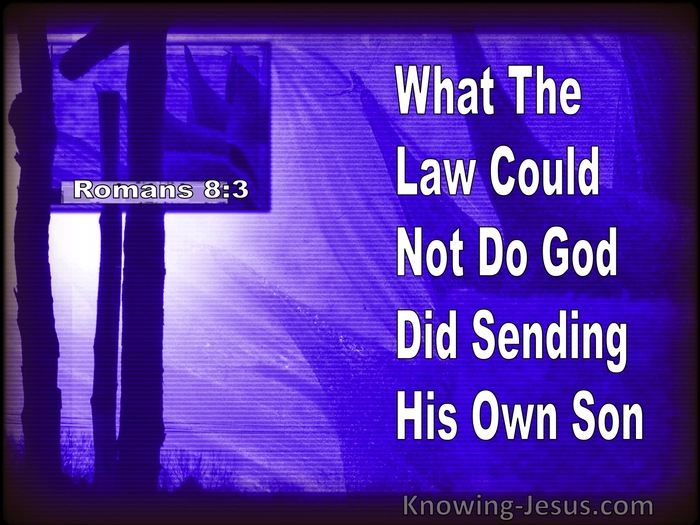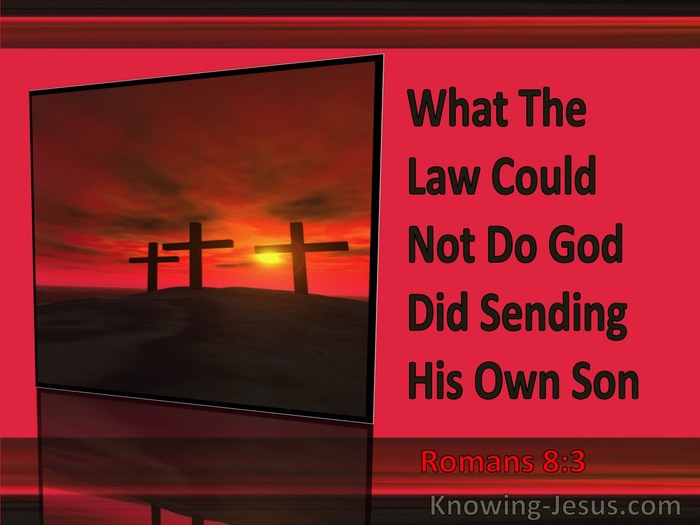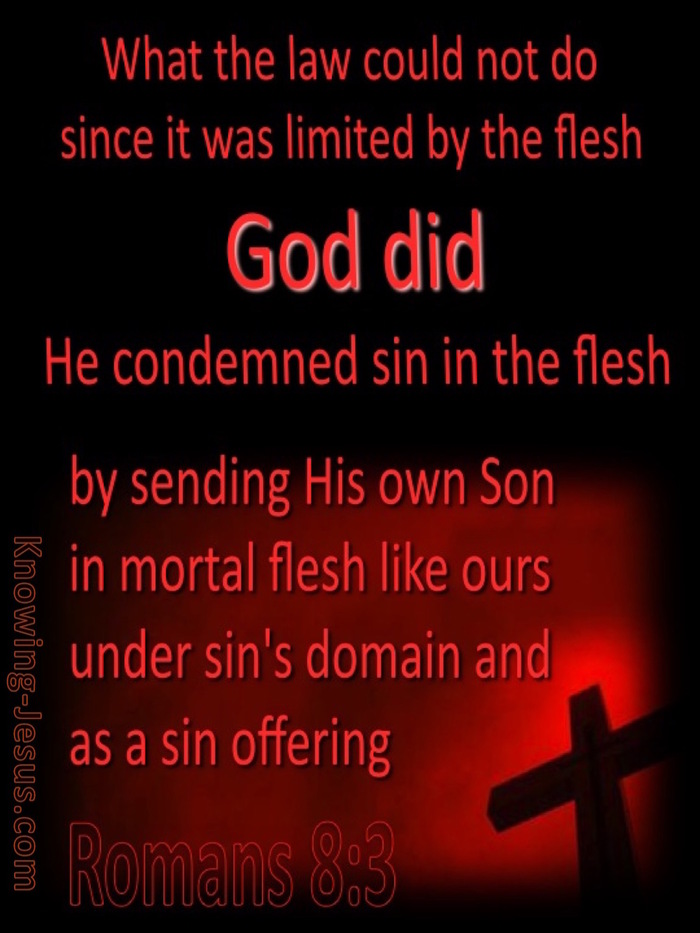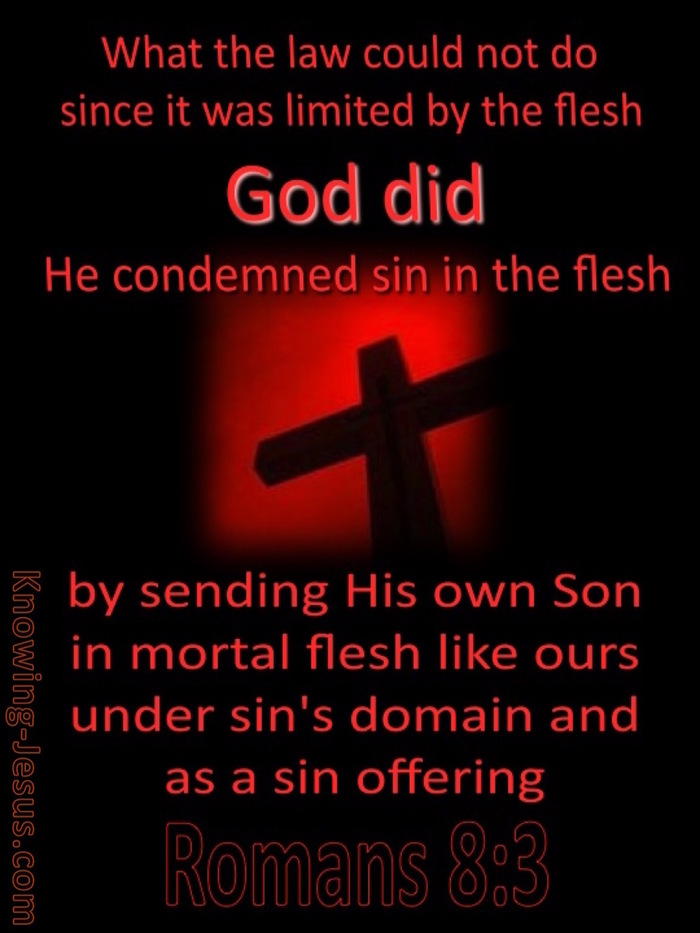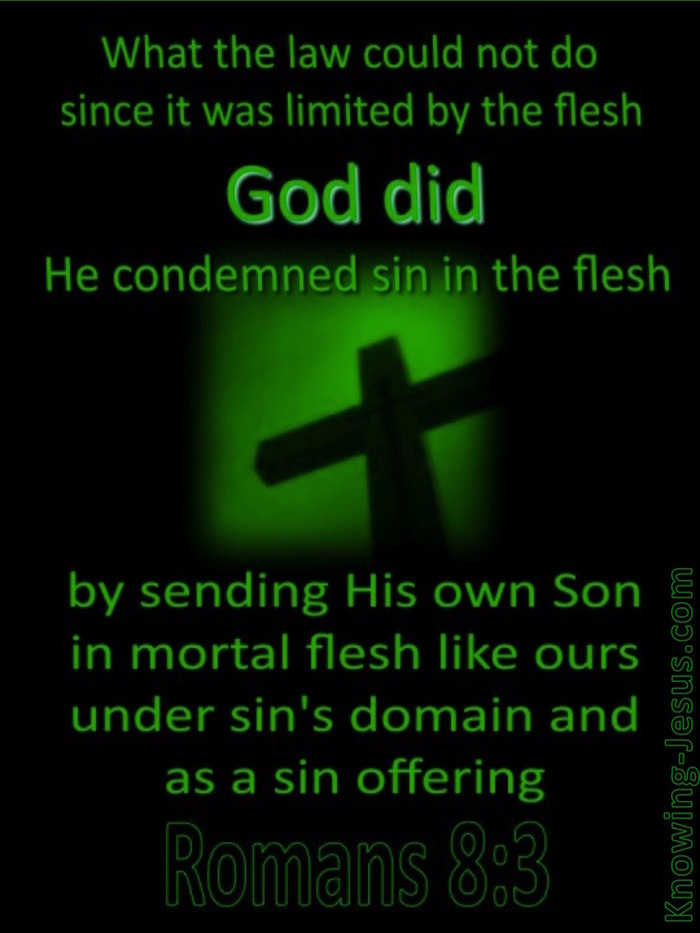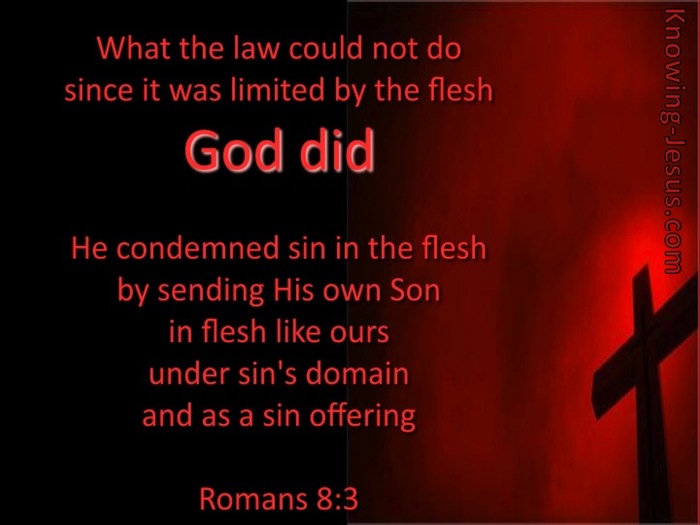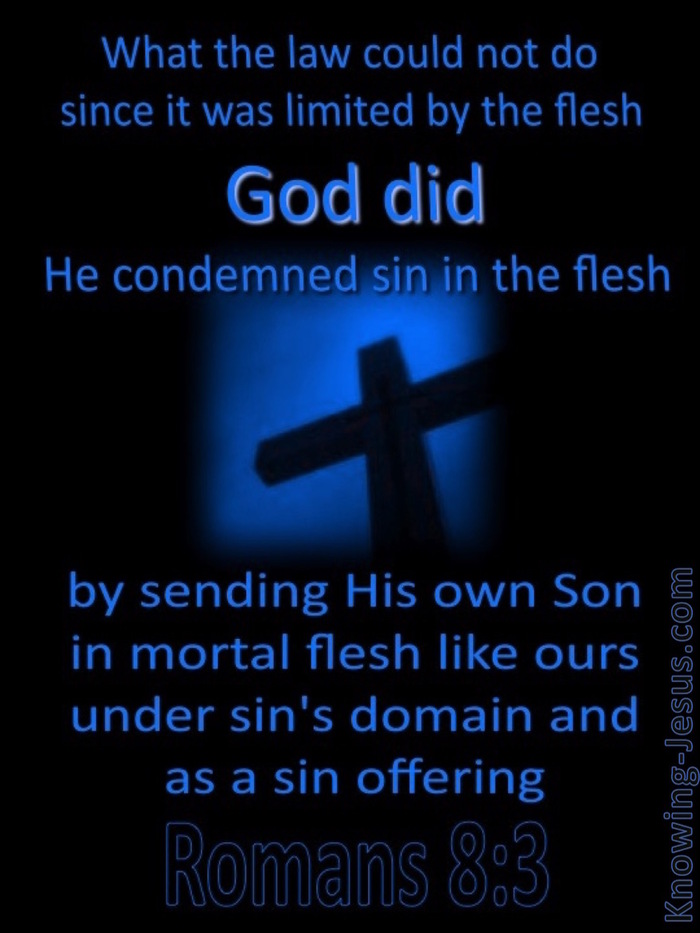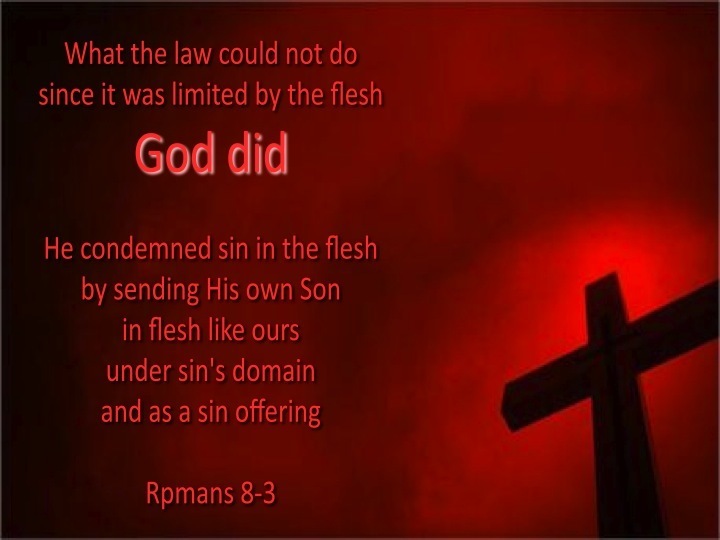Parallel Verses
New American Standard Bible
For
King James Version
For what the law could not do, in that it was weak through the flesh, God sending his own Son in the likeness of sinful flesh, and for sin, condemned sin in the flesh:
Holman Bible
What the law could not do
International Standard Version
For what the Law was powerless to do in that it was weakened by the flesh, God did. By sending his own Son in the form of humanity, he condemned sin by being incarnate,
A Conservative Version
For the impotence of the law, in that it was weak because of the flesh, God, having sent his own Son in a form of flesh of sin, and concerning sin, condemned sin in the flesh,
American Standard Version
For what the law could not do, in that it was weak through the flesh, God, sending his own Son in the likeness of sinful flesh and for sin, condemned sin in the flesh:
Amplified
For what the Law could not do [that is, overcome sin and remove its penalty, its power] being weakened by the flesh [man’s nature without the Holy Spirit], God did: He sent His own Son in the likeness of sinful man as an offering for sin. And He condemned sin in the flesh [subdued it and overcame it in the person of His own Son],
An Understandable Version
For what the law was not able to do [for mankind], since it was [too] weak [to deliver them from condemnation] because fleshly people [were unable to obey it perfectly], God condemned sin in the flesh [i.e., sin was declared evil and its power over man broken]. God did this by sending His own Son in a body like sinful man's, and to destroy sin,
Anderson New Testament
For what the law could not do, because it was weak through the flesh, God has done, who, sending his own son in the likeness of sinful flesh, and for a sin-offering, condemned sin in the flesh,
Bible in Basic English
For what the law was not able to do because it was feeble through the flesh, God, sending his Son in the image of the evil flesh, and as an offering for sin, gave his decision against sin in the flesh:
Common New Testament
For what the law could not do, in that it was weakened through the flesh, God did by sending his own Son in the likeness of sinful flesh, and for sin: he condemned sin in the flesh,
Daniel Mace New Testament
God having sent his own son invested with a body like that of sinful men, as a sacrifice for sin, thereby destroyed its power; which the law could not effect, human nature being in such a corrupted state.
Darby Translation
For what the law could not do, in that it was weak through the flesh, God, having sent his own Son, in likeness of flesh of sin, and for sin, has condemned sin in the flesh,
Godbey New Testament
For there was an impotency of the law, in which it was weak through depravity, God having sent his own Son in the likeness of the sin of depravity and for sin, condemned sin in depravity:
Goodspeed New Testament
For though it was impossible for the Law to do it, hampered as it was by our physical limitations, God, by sending his own Son in our sinful physical form, as a sin-offering, put his condemnation upon sin through his physical nature,
John Wesley New Testament
For what the law could not do, in that it was weak through the flesh, God hath done: sending his own Son in the likeness of sinful flesh, to be a sacrifice for sin, he hath condemned sin in the flesh:
Julia Smith Translation
For the impossibility of the law, in that it was weak by the flesh, God having sent his own Son in the likeness of the flesh of sin, and for sin, condemned sin in the flesh:
King James 2000
For what the law could not do, in that it was weak through the flesh, God sending his own Son in the likeness of sinful flesh, and for sin, condemned sin in the flesh:
Lexham Expanded Bible
For what [was] impossible for the law, in that it was weak through the flesh, God [did]. [By] sending his own Son in the likeness of sinful flesh and concerning sin, he condemned sin in the flesh,
Modern King James verseion
For what the law could not do, in that it was weak through the flesh, God sending his own Son in the likeness of sinful flesh, and for sin, condemned sin in the flesh;
Modern Spelling Tyndale-Coverdale
For what the law could not do, inasmuch as it was weak because of the flesh - that performed God, and sent his son in the similitude of sinful flesh, and by sin damned sin in the flesh;
Moffatt New Testament
For God has done what the Law, weakened here by the flesh, could not do; by sending his own Son in the guise of sinful flesh, to deal with sin, he condemned sin in the flesh,
Montgomery New Testament
For God has done what the Law could not do, weakened as it was by flesh. By sending his own Son in the likeness of sinful flesh, and on account of sin, he condemned sin in the flesh;
NET Bible
For God achieved what the law could not do because it was weakened through the flesh. By sending his own Son in the likeness of sinful flesh and concerning sin, he condemned sin in the flesh,
New Heart English Bible
For what the law could not do, in that it was weak through the flesh, God did, sending his own Son in the likeness of sinful flesh and for sin, he condemned sin in the flesh;
Noyes New Testament
For what the Law could not do, in that it was weak through the flesh, God hath done, who on account of sin sent his own Son in the likeness of sinful flesh, and passed sentence of condemnation on sin in the flesh;
Sawyer New Testament
For what the law could not do because it was weak through the flesh, God having sent his Son in the likeness of sinful flesh, and for sin, condemned the sin in the flesh,
The Emphasized Bible
For, what was impossible by the law in that it was weak through the flesh, God, by sending his own Son in the likeness of sinful flesh and concerning sin, condemned sin in the flesh,
Thomas Haweis New Testament
For that which was impossible by the law, inasmuch as it was impotent through the flesh, God having sent his own Son in the likeness of sinful flesh, and for sin, condemned sin in that flesh:
Twentieth Century New Testament
What Law could not do, in so far as our earthly nature weakened its action, God did, by sending his own Son, with a nature resembling our sinful nature, to atone for sin. He condemned sin in that earthly nature,
Webster
For what the law could not do, in that it was weak through the flesh, God, sending his own Son in the likeness of sinful flesh, and for sin, condemned sin in the flesh:
Weymouth New Testament
For what was impossible to the Law--powerless as it was because it acted through frail humanity--God effected. Sending His own Son in a body like that of sinful human nature and as a sacrifice for sin, He pronounced sentence upon sin in human nature;
Williams New Testament
For though the law could not do it, because it was made helpless through our lower nature, yet God, by sending His own Son in a body similar to that of our lower nature, and as a sacrifice for sin, passed sentence upon sin through His body,
World English Bible
For what the law couldn't do, in that it was weak through the flesh, God did, sending his own Son in the likeness of sinful flesh and for sin, he condemned sin in the flesh;
Worrell New Testament
For, what was impossible under law, wherein it was weak through the flesh. God, sending His Own Son in likeness of sinful flesh, and, respecting sin, condemned sin in the flesh;
Worsley New Testament
For that which was impossible for the law to do, and in which it was weak through the corruption of the flesh, God by sending his own Son in the likeness of sinful flesh to be a sacrifice for sin, hath done; that is, hath condemned sin in the flesh:
Youngs Literal Translation
for what the law was not able to do, in that it was weak through the flesh, God, His own Son having sent in the likeness of sinful flesh, and for sin, did condemn the sin in the flesh,
Themes
The atonement » Has delivered saints from the » Power of sin
Condemnation » Jesus Christ condemning sin
death » What frees you from death
Holy spirit » Those that follow after the spirit
Justification before God » Under the gospel » Is not of works
Law » Christ being the end of the law
Law » Bondage of » Insufficient
Law » Who has fulfilled the law
the Law of moses » Could not give righteousness and life
the Law of moses » Was not the manifestation of the grace of God
Interlinear
En
ἐν
En
ἐν
En
in, by, with, among, at, on, through,
in, by, with, among, at, on, through,
Usage: 2128
Usage: 2128
Astheneo
Dia
heautou
Peri
Hamartia
ἁμαρτία
Hamartia
Usage: 143
Devotionals
Devotionals about Romans 8:3
Devotionals containing Romans 8:3
References
Hastings
Morish
Word Count of 37 Translations in Romans 8:3
Prayers for Romans 8:3
Verse Info
Context Readings
Set Free From The Law Of Sin And Death
2
The law of the Spirit gives us life through (with) (because of) Christ Jesus. It has set me free from the law of sin and death.
3 For
Names
Cross References
Acts 13:39
Through him all who believe are justified from all things. You could not be justified through the Law of Moses.
2 Corinthians 5:21
He made the one who knew no sin to be sin on our behalf. That way we might become the righteousness of God in him.
Hebrews 10:14
With one offering he has perfected those who are sanctified forever.
Philippians 2:7
He emptied (humbled) himself by taking the form of a servant. He was made in the likeness of men.
Hebrews 10:1-10
The Law is a shadow of the good things to come. It is not the actual things. The continual yearly sacrifices can never make those who worship perfect.
Mark 15:27
They impaled two robbers with him, one on his right hand, and one on his left.
John 1:14
The Word [Jesus] became flesh (a human being) and lived with us. We saw the glory of the only begotten son from the Father. He was full of loving-kindness and truth.
John 3:14-17
As Moses lifted up the serpent in the wilderness, so the Son of man must also be lifted up.
John 9:24
So they called the man that was blind a second time, and said to him: Give glory to God. We know that this man is a sinner.
Romans 3:20
No flesh will be justified before God by works of the law. Knowledge of sin comes from the law.
Romans 6:6
We know this that our old self was impaled with him that the body of sin might be destroyed, that we should no longer be in bondage to sin.
Romans 7:5-11
When we were in the flesh, the sinful passions, which were through the law, worked in our members to bring forth fruit to death.
Romans 8:32
He that did not spare his own Son, but delivered him up for us all, will he not with him freely give us all things?
Romans 9:3
I could wish that I were accursed (separated) (banned) (excommunicated) from Christ for the good of (in behalf of) my countrymen and brothers (the Jews).
Galatians 3:13
Christ redeemed us from the curse of the law by becoming a curse for us. It is written; Cursed is everyone who is hung on a stake.
Galatians 3:21
Is the Law then against the promises of God? God forbid! If a law had been given which could impart life, righteousness would have been from the Law.
Galatians 4:4-5
When the full time came, God sent his Son, born of a woman, born under the law,
Hebrews 2:14
Since the children are partakers of flesh and blood, he also took part of the same things, that through death he might destroy him that had the power to cause death, [Satan] the Devil.
Hebrews 2:17
This means that he had to become like his brothers in every way, in order to be their faithful and merciful High Priest in his service to God, in order to offer a propitiatory sacrifice (pay atonement) (to make reconciliation) for the sins of the people.
Hebrews 4:15
We do not have a high priest who is not able to sympathize with our infirmities (weaknesses). He was tested in all things like ourselves. Yet he was without sin!
Hebrews 7:18-19
The former commandment was set aside because it was weak and useless.
Hebrews 10:12
But this man, after he had offered one sacrifice for sins forever, sat down at the right hand of God,
1 Peter 2:24
He bore our sins in his body upon the stake, that we, having died to sins, might live to righteousness. You were healed because of his wounds (stripes).
1 Peter 4:1-2
Since Christ suffered physically for us, you too must strengthen yourselves with the same way of thinking that he had. Whoever suffers physically has ceased from sin.
1 John 4:10-14
In this is love, not that we loved God, but that he loved us, and sent his Son to be the propitiation (atonement) (sacrificial payment) for our sins.
